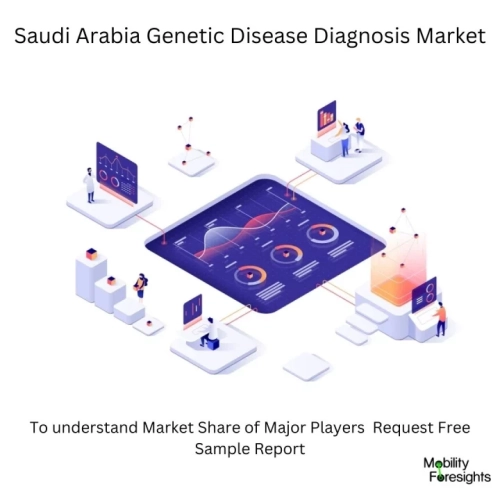
- Get in Touch with Us

Last Updated: Apr 26, 2025 | Study Period:
SAUDI ARABIA GENETIC DISEASE DIAGNOSIS MARKET
KEY FINDINGS
The Saudi Arabia Genetic Disease Diagnosis Market is poised for significant growth, driven by a combination of increasing awareness of genetic disorders, advancements in diagnostic technologies, and supportive government initiatives. The prevalence of genetic diseases, such as thalassemia and sickle cell anemia, has heightened the demand for accurate diagnostic services, encouraging families to seek early interventions.
The market is characterized by the integration of advanced technologies, including next-generation sequencing (NGS) and polymerase chain reaction (PCR), which have enhanced the precision and efficiency of genetic testing. Non-invasive prenatal testing (NIPT) is gaining traction, favored for its safety and reliability, particularly among expectant parents.In 2023, the Saudi Arabia genetic testing market was valued at $0.27 billion, and is expected to grow at a CAGR of 9.75% through 2029. The diagnostic testing segment held the largest share of the market in 2023

Government policies are pivotal in shaping the market landscape, with initiatives aimed at improving healthcare infrastructure and increasing access to genetic testing. Public health campaigns have also contributed to heightened awareness, fostering a cultural shift towards preventive healthcare. Key players in the market include both multinational corporations and local laboratories, focusing on collaboration to expand service offerings and enhance the quality of diagnostics. While the market presents substantial opportunities, challenges such as high testing costs and disparities in access to services in rural areas remain.
Overall, the Saudi Arabia Genetic Disease Diagnosis Market is on a promising trajectory, with increasing investments in technology and a growing emphasis on genetic health, setting the stage for a robust and comprehensive healthcare ecosystem.
The Saudi Arabia Genetic Disease Diagnosis Market is an emerging sector within the country's healthcare landscape, driven by a rising awareness of genetic disorders and the need for early detection and management. As genetic diseases such as thalassemia, cystic fibrosis, and hereditary cancers become more prevalent, the demand for effective diagnostic solutions is surging.
Recent advancements in technology, including next-generation sequencing (NGS), polymerase chain reaction (PCR), and bioinformatics, have significantly improved the accuracy and speed of genetic testing. These innovations facilitate better patient outcomes through timely diagnosis and tailored treatment plans.
Government initiatives play a crucial role in fostering this market's growth. With a focus on enhancing healthcare services and promoting genetic research, the Saudi government has implemented policies aimed at integrating genetic testing into routine medical care. Public awareness campaigns further educate the population about the benefits of genetic screening, encouraging proactive health measures. The market comprises a diverse range of services, including carrier testing, prenatal testing, and diagnostic evaluations, appealing to various segments of the population.
Both local laboratories and multinational companies are active players, collaborating to expand their offerings and improve accessibility. Despite its promising growth trajectory, the market faces challenges, such as high testing costs and limited availability in rural areas. However, ongoing investments in healthcare infrastructure and a commitment to improving health equity are expected to drive the market forward. The Saudi Arabia Genetic Disease Diagnosis Market is set to evolve rapidly, contributing significantly to the countryâs public health landscape.
The Saudi Arabia Genetic Disease Diagnosis Market is witnessing several key trends that are shaping its evolution.
Growing public awareness about genetic disorders has led to a heightened demand for diagnostic services. Campaigns promoting genetic testing have made families more proactive in seeking early diagnosis and preventive care. Rapid developments in genetic testing technologies, particularly next-generation sequencing (NGS) and advanced bioinformatics, are enhancing the accuracy and efficiency of diagnoses. These innovations allow for comprehensive genetic profiling and faster turnaround times. Non-invasive prenatal testing (NIPT) is gaining popularity due to its safety and effectiveness. This trend reflects a broader shift towards less invasive diagnostic methods, making testing more accessible to a larger population.
The Saudi government is actively promoting genetic research and testing through supportive policies and funding. This initiative aims to improve healthcare outcomes and integrate genetic testing into routine healthcare practices.
There is a growing focus on personalized medicine, which tailors treatment plans based on individual genetic profiles. This approach enhances treatment efficacy and minimizes adverse effects, making it a preferred option for patients and healthcare providers. Collaborations between local laboratories and multinational companies are increasing, aimed at expanding service offerings and improving access to genetic testing across the country.
These trends indicate a dynamic and rapidly evolving market landscape, positioning Saudi Arabia at the forefront of genetic disease diagnosis in the region.
New product development in the Saudi Arabia Genetic Disease Diagnosis Market is driven by technological advancements, evolving consumer needs, and regulatory support.
Companies are launching advanced NGS platforms that offer comprehensive genomic analysis, enabling faster and more accurate detection of genetic disorders. These products often come with user-friendly software for data interpretation, making them accessible to healthcare providers. The development of highly sensitive NIPT kits is a significant trend. These products minimize risk to both mother and fetus while providing reliable results for chromosomal abnormalities, catering to the rising demand among expectant parents.
New multi-gene panels targeting specific ethnicities prevalent in Saudi Arabia are being developed. These panels can efficiently screen for hereditary diseases common in the region, facilitating early diagnosis and intervention. As telemedicine gains traction, new platforms that integrate genetic testing with telehealth services are emerging. These solutions allow patients to access genetic counseling and test results remotely, enhancing convenience and accessibility.
The integration of diagnostic products with personalized medicine approaches is on the rise. Companies are developing algorithms that not only identify genetic conditions but also recommend tailored treatment options based on individual genetic profiles. As awareness grows, there is a push for educational products that inform patients and healthcare providers about genetic disorders and the importance of testing, ensuring better-informed decision-making.
These innovations reflect a commitment to improving healthcare outcomes through enhanced diagnostic capabilities in Saudi Arabia.
| Sl no | Topic |
| 1 | Market Segmentation |
| 2 | Scope of the report |
| 3 | Research Methodology |
| 4 | Executive summary |
| 5 | Key Predictions of the Saudi Arabia Genetic Disease Diagnosis Market |
| 6 | Avg B2B price of Saudi Arabia Genetic Disease Diagnosis Market, By Region |
| 7 | Major Drivers For Saudi Arabia Genetic Disease Market |
| 8 | Saudi Arabia Genetic Disease Market Production Footprint - 2023 |
| 9 | Technology Developments In Saudi Arabia Genetic Disease Market |
| 10 | New Product Development In Saudi Arabia Genetic Disease Market |
| 11 | Research focus areas on new Saudi Arabia Genetic Disease |
| 12 | Key Trends in the Saudi Arabia Genetic Disease Market |
| 13 | Major Projects Utilizing Hydrogen Electrolyzer |
| 14 | Market Size, Dynamics And Forecast, By Geography, 2024-2030 |
| 15 | Market Size, Dynamics And Forecast, By Type of Test, 2024-2030 |
| 16 | Market Size, Dynamics And Forecast, By Technology, 2024-2030 |
| 17 | Market Size, Dynamics And Forecast, By Application, 2024-2030 |
| 18 | Market Size, Dynamics And Forecast, By End User, 2024-2030 |
| 19 | Competitive Landscape Of Saudi Arabia Genetic Disease |
| 20 | Mergers and Acquisitions |
| 21 | Competitive Landscape |
| 22 | Growth strategy of leading players |
| 23 | Market share of vendors, 2023 |
| 24 | Company Profiles |
| 25 | Unmet needs and opportunity for new suppliers |
| 26 | Conclusion |